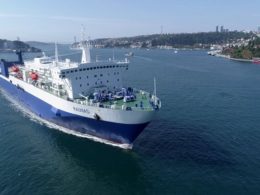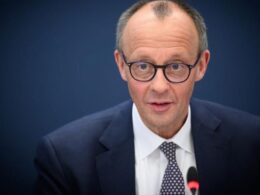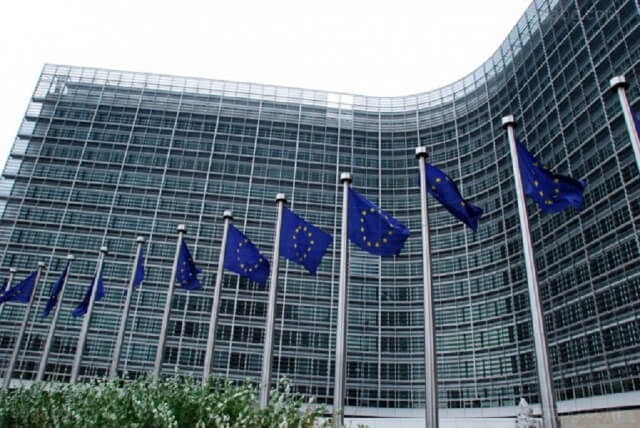Ukraine advances near Bakhmut and strike the Chonhar bridge to Crimea. Zaporizhzhia nuclear power plant's 5th power unit in cold shutdown and 4th in hot shutdown modes. African leaders pressure Putin to end the war.
Daily overview — Summary report, July 30
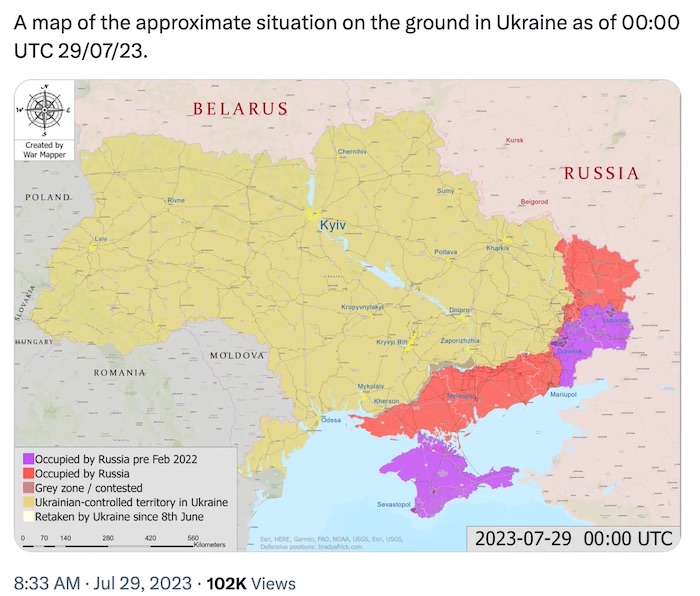
According to information from the General Staff as of 06.00 30.07.2023, supplemented by its [18:00 assessment].

“The Russian Federation continues to wage its war of aggression disregarding the significant losses. The adversary continues to kill civilians in Ukraine, ignore the laws and customs of war, and use terror tactics.
Last night, the Russian Federation launched yet another airstrike on Ukraine, using Iranian Shahed combat UAVs. Information on the aftermath of this terrorist attack is currently being updated.
On July 29, the enemy launched 8 missiles, 33 airstrikes and 53 MLRS attacks at the positions of Ukrainian troops and various settlements. Unfortunately, the attacks have caused civilian casualties and damaged residential buildings.
The likelihood of further missile and airstrikes across Ukraine remains high.
On July 29, there were 36 combat engagements.
- Volyn and Polissya axes: no significant changes. No signs of the formation of enemy offensive groups were found.
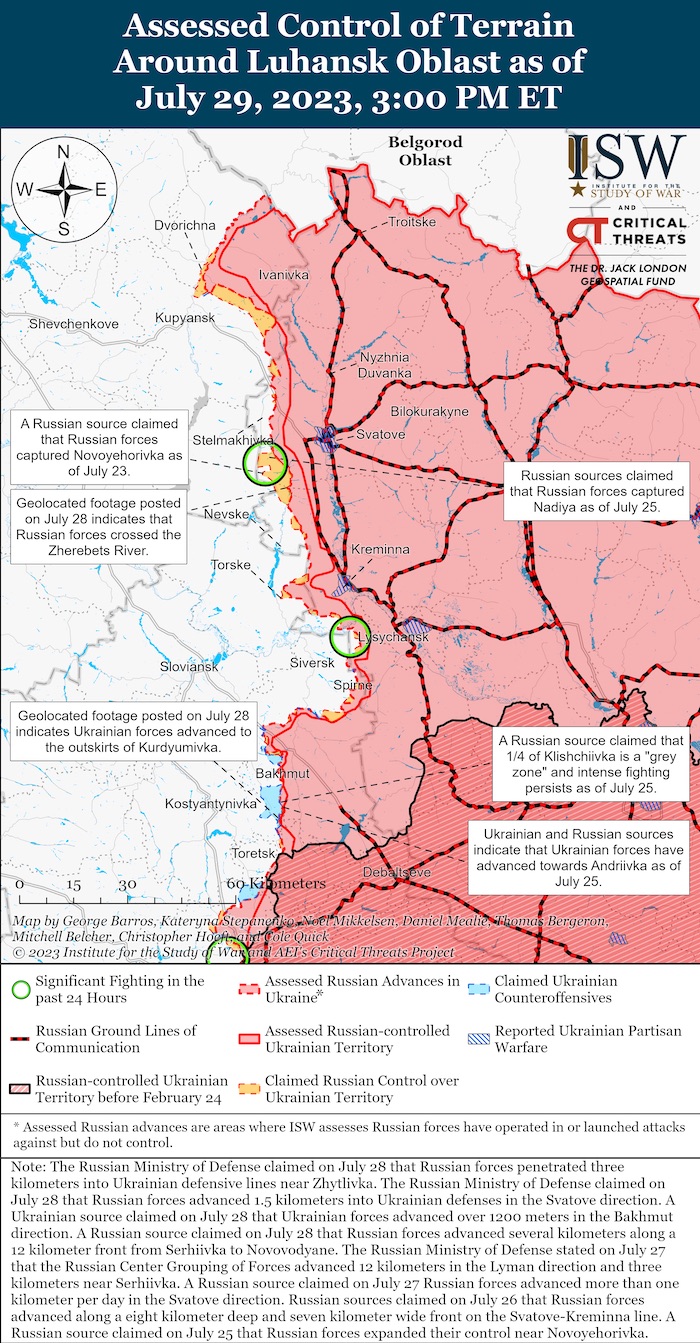
- Sivershchyna and Slobozhanshchyna axes: the adversary fired mortars and artillery at over than 20 settlements, including Mykolaivka (Chernihiv oblast), Stara Huta, Hrabovs’ke, Budivel’ne, Volfyne (Sumy oblast), Udy, Kozacha Lopan’, Okhrimivka, Ohirtseve, and Tykhe (Kharkiv oblast).
- Kupiansk axis: the adversary shelled Topoli, Dvorichna, Zapadne, Kyslivka, Berestove, Kindrashivka, and Kup’yans’k (Kharkiv oblast) with artillery and mortars.
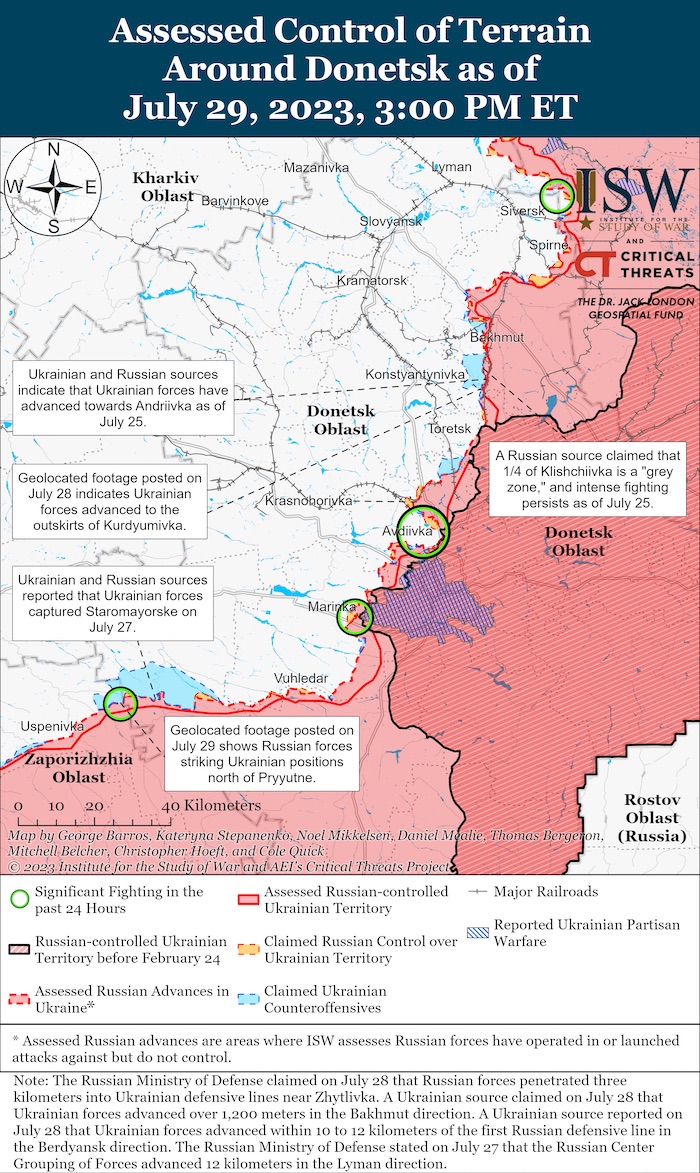
- Lyman axis: the enemy conducted unsuccessful offensives in the vicinities of Novojehorivka and Bilohorivka (Luhansk oblast). Nevske, Bilohorivka (Luhansk oblast), Verkhn’okam’yans’ke, Tors’ke, Spirne, and Rozdolivka (Donetsk oblast) were shelled with artillery.
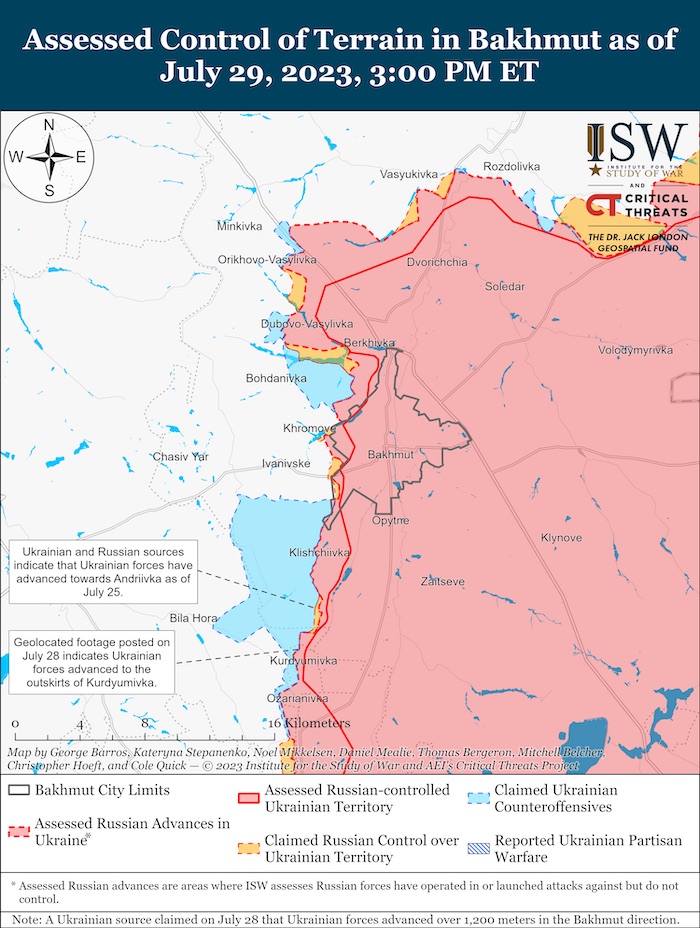
- Bakhmut axis: more than 15 settlements, including Orikhovo-Vasylivka, Bohdanivka, Chasiv Yar, Ivanivske, Bila Hora, and Druzhba, suffered from enemy artillery shelling.
- Avdiivka axis: the adversary launched an airstrike in the vicinity of Nevel’s’ke. The invaders fired artillery at more than 10 settlements, including Avdiivka, Sjeverne, Pervomaiske, Karlivka, and Novokalynove (Donetsk oblast).
- Marinka axis: the Ukrainian Defence Forces continue to hold back the Russian offensive in the vicinity of the city of Marinka. The adversary launched an airstrike in the vicinity of Krasnohorivka and shelled more than 15 settlements, including Krasnohorivka, Mar’inka, Novomykhailivka, and Heorhiivka (Donetsk oblast).
- Shakhtarske axis: the adversary launched airstrikes in the vicinities of Makarivka, Staromaiors’ke, shelled the settlements of Yelyzavetivka, Odradne, Blahodatne, Makarivka, Rivnopil’, Staromaiors’ke, and Vil’ne Pole (Donetsk oblast).

- Zaporizhzhia and Kherson axes: the adversary focuses its main efforts on preventing the further advance of Ukrainian troops. The enemy launched airstrikes in the vicinities of Mala Tokmachka, Orikhiv (Zaporizhzhia oblast), and Antonivka (Kherson oblast). More than 30 settlements came under artillery fire, including Novodarivka, Mala Tokmachka, Bilohir’ya, Mali Shcherbaky, Kam’yans’ke (Zaporizhzhia oblast), Zolota Balka, Tokarivka, Antonivka, Tyahynka, Mykhailivka (Kherson oblast). At the same time, the Ukrainian Defense Forces continue to conduct the offensive operation on Melitopol’ and Berdyans’k axes, consolidating their positions.

Military Updates

On July 29, Ukrainian Air Force launched 9 airstrikes on the concentrations of troops, weapons and military equipment of the adversary. Also, the Ukrainian defenders intercepted 4 operational-tactical level reconnaissance UAVs of the enemy.
On July 29, the Ukrainian missile and artillery troops hit 1 artillery system at its firing position, 1 ammunition depot, electronic warfare station, and 1 concentration of enemy troops.“
Ukrainian forces advanced on the southern flank near Bakhmut, Ukrinform reports, citing Deputy Defence Minister Hanna Maliar. “Today, we continued to move forward on the southern flank around Bakhmut. There are certain gains. As for the northern flank, fighting continues without any change in positions, she said. According to Maliar, Russian invaders are moving additional forces and resources to the Bakhmut sector. In Bakhmut city, shelling continues from both sides. The enemy is actively using large-calibre machine guns and anti-tank guided missiles (ATGMs). The Russians also deployed a surveillance system.
Russian troops are active in the Kupiansk and Lyman sectors. Several times the invaders tried to advance today but suffered failures and losses. Fighting continues in the Avdiivka area. The enemy is unsuccessfully trying to advance. But our defenders do not leave him a single chance, she said.
According to her, the Russians today intensified assault operations in the Marinka area, using tanks, infantry fighting vehicles, etc. It did not bring any success to the invaders and Ukraine's defense forces repelled all assaults and significantly destroyed the enemy's offensive potential.
On the Berdiansk and Melitopol axis, Ukrainian defenders are advancing gradually, but surely. Fighting continues in all directions of the offensive. Our defenders are doing their work around several settlements. But all the details will come when the safety of operations allows, Maliar added.”
Saboteurs blow up ammunition storage point in Sevastopol – Ukrainian Defence Intelligence, Ukrainska Pravda reports, citing Ukrainian Defence Intelligence. “A Russian ammunition storage point exploded late in the evening on 28 July in the Cossack Bay of occupied Crimea, Ukrainian military intelligence reported. The explosion occurred around 22:00 (Kyiv time) on 28 July. According to Defence Intelligence, witnesses heard two explosions and the sounds of further detonation of ammunition. […]
Intelligence notes that Russia's 810th Guards Naval Infantry Brigade is currently stationed in Cossack Bay. It is known that explosions and detonation, resulting from sabotage, took place at a temporary storage point of Russian ammunition. Cossack Bay is located 15 kilometres from the city centre of Sevastopol.”
Russians say Ukraine attempted to destroy railway connecting Kherson Oblast and Crimea, Ukrainska Pravda reports. “Volodymyr Saldo, a Russian collaborator and the Russian-appointed governor of the occupied part of Kherson Oblast, has said that Ukraine’s defence forces attempted to destroy the railway between the Russian-occupied part of Kherson Oblast and Crimea.”
Ukrainian forces report new strike on Chonhar bridge to Crimea, Ukrinform reports, citing the strategic communications department of the Office of the Commander-in-Chief of the Armed Forces of Ukraine. “Ukraine's defence forces on Saturday launched a successful strike on the Chonhar bridge linking southern Ukraine to the Crimean peninsula. […] Crimean Telegram channels, citing eyewitnesses, said the Chonhar bridge had been closed to traffic.”
On the night of July 30, 2023, the enemy attacked from the south-eastern direction with four attack UAVs of the "Shahed" type, the Ukrainian General Staff reports. “All enemy UAVs were destroyed within the borders of the Kherson and Dnipropetrovsk regions by the forces and means of the Air Force. On July 29, air defence destroyed four operational-tactical reconnaissance UAVs.”
Russians are preparing groundwork for provocations in Black Sea, OC "South", Censor.net reports, citing the head of the joint press center of the Operational Command "South" Natalia Humeniuk with reference to Ukrinform. “The enemy has long been preparing the groundwork for provocations in the Black Sea. For example, it is claimed that Ukraine used the grain corridor to attack the Russian fleet. We are monitoring all these messages, all this logic of the development of events and are ready for the fact that there may be provocations. It will be absolutely clear from our side to expose them, Humeniuk said. […]
Recent information that one of the ships of the Black Sea Fleet was attacked by unknown drones was also aimed at heating up such a preliminary basis for future attacks, Humeniuk noted.”
Defence forces have taken measures to strengthen protection of port infrastructure, - OC "South", Censor.net reports, citing the spokeswoman of the OC "South" Natalia Humeniuk with reference to Suspilne. “The defence forces of Ukraine have taken measures to strengthen the air defence of the port infrastructure, which the Russians are attacking more and more actively after leaving the grain agreement.
We hope that the measures taken will be quite effective but observing that the enemy has taken a certain pause, we can conclude that he is preparing for the next attacks using possibly new tactics, Humenyuk said.”
Russian naval posturing in the Black Sea likely aims to impose a de facto blockade on Ukrainian ports without committing the Black Sea Fleet to the enforcement of a naval blockade, ISW assess. “Ukrainian Southern Operational Command Spokesperson Captain First Rank Nataliya Humenyuk reported on July 28 that Ukrainian officials have intercepted radio transmissions of Russian forces warning civilian ships in the Black Sea against heading to Ukrainian ports. A Russian milblogger amplified an audio recording purportedly of a Russian warship telling a civilian vessel in the Black Sea that Russian forces would consider the vessel involved in the conflict in Ukraine as a military cargo ship if it sailed towards a Ukrainian port. Russian sources also claimed that Russian authorities announced a nighttime navigation ban for all small vessels near the Kerch Strait due to concerns about Ukrainian naval drones. […]
The Russian Foreign Ministry (MFA) recently attempted to soften the Russian Ministry of Defense’s (MoD) July 19 announcement about viewing civilian ships in the Black Sea as legitimate military targets by claiming that the announcement meant that Russian forces would inspect ships. The Russian MoD itself has not clarified what actions its announcement will allow the Russian military to take and even the Russian MFA’s interpretation would require Russian forces to board and possibly seize foreign civilian vessels.
The Russian naval posturing in the Black Sea is likely intentionally ambiguous to generate widespread concern about possible detention by the Russian navy or outright strikes on civilian vessels. The Kremlin likely aims for this posturing to have a chilling effect on maritime activity so that Russian naval assets do not need to enforce an actual blockade of Ukrainian ports. A naval blockade is only mandatory for neutral entities to follow under international law if a belligerent declares the existence of the blockade, and Russia has yet to do so.
Hans Petter Midttun: In my latest article «Maritime security in the Black Sea is an international problem” I point out that Ukraine has been exposed to a limited maritime blockade (Sea of Azov) since April 2018 and a full blockade since 13 February 2022.
Ukraine uses North Korean rockets to blast Russian forces - Financial Times, Reuters reports. “Ukrainian soldiers were observed using North Korean rockets that they said were seized by a "friendly" country before being delivered to Ukraine, the Financial Times reported on Saturday. Ukraine's defence ministry suggested the arms were captured from the Russians, the newspaper said.
The United States has accused North Korea of providing arms to Russia, including alleged shipments by sea, but has not offered proof and North Korean weapons have not been widely observed on the battlefields in Ukraine. North Korea and Russia deny conducting arms transactions.
The North Korean weapons were shown by Ukrainian troops operating Soviet-era Grad multiple-launch rocket systems near the destroyed eastern city of Bakhmut, site of lengthy brutal fighting, the report said.”
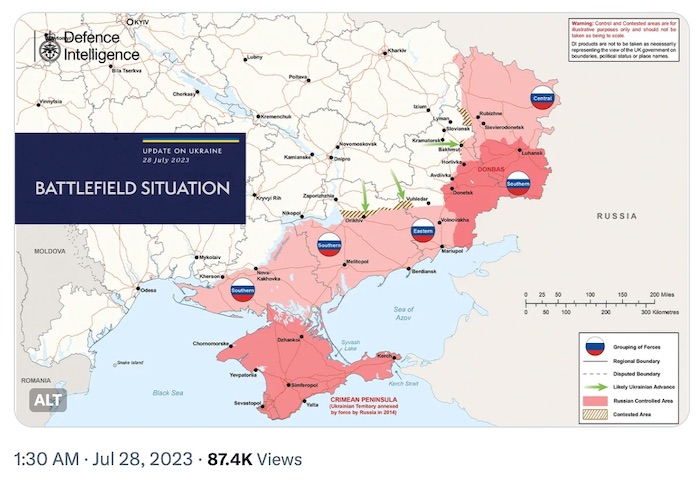
According to British Defence Intelligence, (last 48 hours):
- Since mid-July 2023, at least several thousand Wagner troops have likely established themselves at a military camp at Tsel, in central Belarus. Imagery shows that since mid-July 2023, hundreds of vehicles have arrived at the previously mostly empty facility.
- Separate reports suggest most of the visible vehicles are trucks and minibuses with few armoured combat vehicles. It remains unclear what has happened to the heavy equipment Wagner used in Ukraine; there is a realistic possibility that it was forced to return these to the Russian military.
- Wagner’s ability to secure heavy equipment and enablers such as air transport will be key factors in its future combat effectiveness.
- Over the last 48 hours there has been an uptick of fighting in two sectors in southern Ukraine.
- South of Orikhiv, fighting is focused near the village of Robotyne, in the area of responsibility for Russia’s 58th Combined Arms Army.
- Eighty kilometres to the east, Ukrainian forces defeated elements of Russian airborne forces’ (VDV) 247th Guards Air Assault Regiment to capture the village of Staromaiorske.
- Meanwhile, in the north, other VDV units continue offensive operations in the Serebriansk Forest west of Kremina but have achieved little ground.
Losses of the Russian Army
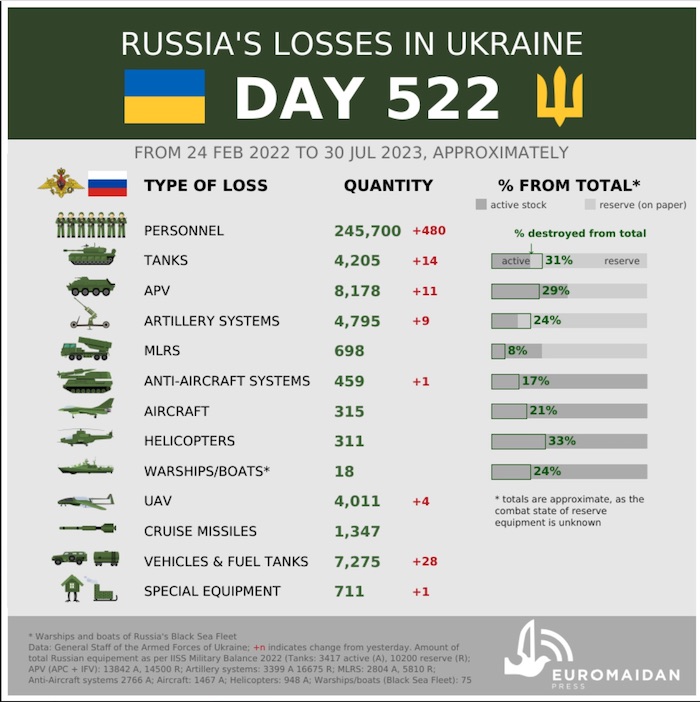
As of Sunday 30 July, the approximate losses of weapons and military equipment of the Russian Armed Forces from the beginning of the invasion to the present day:
- Personnel – about 245700 (+480)
- Tanks – 4205 (+14)
- Armoured combat vehicles – 8178 (+11)
- Artillery systems – 4795 (+9)
- Multiple rocket launchers –MLRS - 698 (+0)
- Air defence means – 459 (+1)
- Aircraft - 315 (+0)
- Helicopters - 311 (+0)
- Automotive technology and fuel tanks – 7275 (+28)
- Vessels/boats - 18 (+0)
- UAV operational and tactical level – 4011 (+4)
- Special equipment – 711 (+1)
- Mobile SRBM system – 4 (+0)
- Cruise missiles – 1347 (+0)
Humanitarian
Russia has not offered UN World Food Programme free grain, Reuters reports. “Russia has not offered the UN World Food Programme (WFP) any free grain, WFP deputy chief Carl Skau said on Friday, nearly two weeks after Moscow quit a deal that allowed the safe Black Sea export of Ukraine grain. Ukrainian grain is a primary UN food aid source. […] Russian President Vladimir Putin on Thursday told African leaders at a summit in St Petersburg that Moscow is able to replace Ukrainian grain exports to Africa and that he would gift tens of thousands of tons of grain to six countries within months.
Ukraine, along with Russia, is one of the world's biggest exporters of grain and any interruption could drive up food prices around the globe. UN Secretary-General Antonio Guterres warned on Thursday that a "handful of donations" won't correct the dramatic impact of the end of the Black Sea grain deal.
Under the Black Sea export pact, the WFP purchased and shipped 725,000 tonnes of grain to Afghanistan, Djibouti, Ethiopia, Kenya, Somalia, Sudan and Yemen over the past year. The pact has allowed WFP so far to procure 80% of its wheat grain purchases this year from Ukraine, up from 50% in 2021 and 2022.
Overall, nearly 33 million tonnes of grain were exported by Ukraine under the deal, which aimed to combat a global food crisis worsened by Russia's February 2022 invasion of Ukraine. For our operations the impact will be that we have to look elsewhere, which potentially can be more costly and certainly will have longer lead ways, Skau said. One of the reasons why Ukraine has been such an important source for us is the proximity to many of our operations."
"Grain Corridor" in the Black Sea in June - July 2023. Final statistics and database, Black Sea News reports. "The Black Sea Initiative went down in history as an important diplomatic success" (R. Erdogan, President of Türkiye, July 17, 2023). The words of the President of Türkiye can be interpreted differently, but we are publishing the final statistics of the "Black Sea Grain Initiative" for this very "story". The main goal of this study, like the previous ones , was to establish the dynamics of the average number of vessels arriving per day to the 3 ports of the Odesa region within the framework of this agreement. We will remind that we have always considered this indicator as one of the indicators of the level of military risks in the Black Sea. […] Indicators indicate that the level of military risks has increased especially sharply since April 2023 and is currently reaching its maximum value.
Diagram 1. Dynamics of the average number of vessels arriving at the ports of Ukraine via the grain corridor per month and per day from September 1, 2022 to July 17, 2023 […]
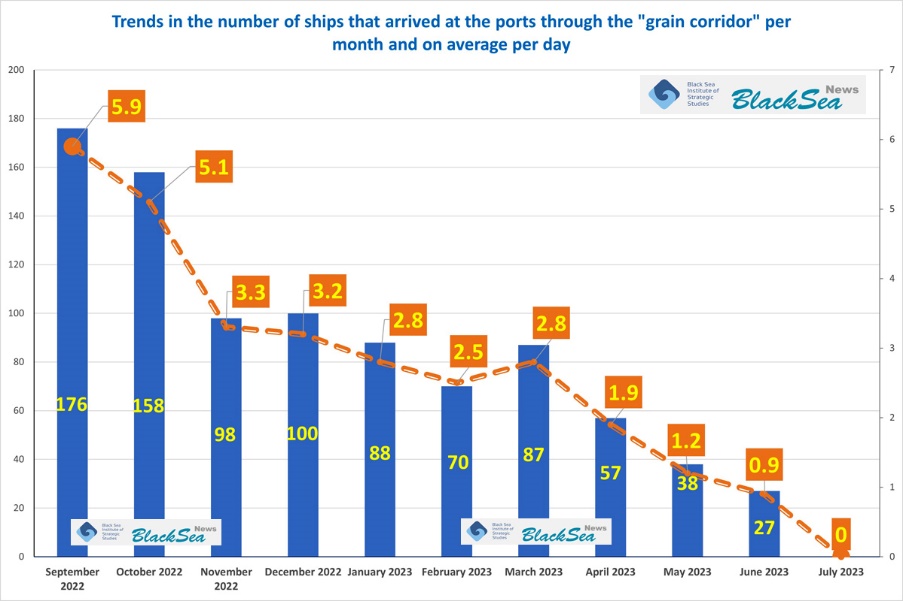 For the implementation of the grain initiative, a Joint Coordination Center (JCC) was created in Istanbul, which included representatives of Ukraine, Russia, Türkiye and the UN. Each Party and the UN were represented in the SCC by one high-ranking person and the agreed-upon required number of representatives.
For the implementation of the grain initiative, a Joint Coordination Center (JCC) was created in Istanbul, which included representatives of Ukraine, Russia, Türkiye and the UN. Each Party and the UN were represented in the SCC by one high-ranking person and the agreed-upon required number of representatives.
Inspection groups consisting of representatives of Ukraine, Russia, Türkiye, and the UN were also created in Türkiye. The ships transited to the ports of Ukraine and entered the ports of Ukraine according to the schedule approved by the SCC, after inspection of the ships by the inspection group. The main duty of the inspection teams was to check the absence of unauthorized cargo and personnel on board ships bound for or departing from Ukrainian ports. The long periods, starting from May 9, 2023, when no ships came to the ports, are explained not by weather conditions, but solely by the blocking of inspections by Russian inspectors as part of the SCC for various reasons. […]
Note that in the period from January 1 to July 17, 2023, 23% of ships that passed through the "grain corridor" belonged to Turkish shipowners, 45.5% - to Greek shipowners.”
Energy minister says he is confident Ukraine will keep lights on this winter, Reuters reports. “Ukraine's energy minister, reflecting on Saturday on what he has portrayed as the largest repairs campaign to a power system in modern history, expressed confidence the country could meet its generation needs during the cold months. Asked in a televised interview whether the country would be able to meet its goal of providing 1.7 gigawatts of generation capacity by the heating season, German Galushchenko said, We will manage to do it.
He said he could not give details now but that the country was adding power in ways it had never done before. I am very confident that the symbiosis of all actions will lead to the fact that we will be able to reliably ensure supplies during the heating season.
Missile and drone attacks on energy infrastructure following Russia's full-scale invasion last year caused sweeping blackouts and water outages for millions of Ukrainians during the winter. Galushchenko said that while the scale of any new Russian attacks were hard to predict, Ukraine would be able to carry out repairs.”
Environmental
Zaporizhzhia NPP's 5th power unit in cold shutdown and 4th in hot shutdown modes, Ukrainska Pravda reports, citing Raphael Grossi, Director General of the IAEA, with reference to the organization's website. “The staff of the occupied Zaporizhzhia Nuclear Power Plant (ZNPP) has completed the planned switch of the 5th power unit to the cold shutdown mode, simultaneously switching the 4th power unit to a hot shutdown mode. It is noted that the change in the status of the reactor was carried out in order to conduct maintenance works on the power unit No. 5, which is possible only in the "cold shutdown" mode. […]
The IAEA experts, who are at the site, call on the ZNNP administration to study all possible options for installing an external boiler for the production of the necessary steam, which would allow all power units to be put into a "cold shutdown" state. The IAEA reminded that the Ukrainian national regulator, Derzhatomrehuliuvannia, has issued normative orders limiting the operation of all six power units to the state of "cold shutdown".
Yesterday, the IAEA team visited reactor unit 5 where they observed the reactor vessel, spent fuel pool and the steam generator. The team noted that all equipment seemed to be in normal condition. There were no restrictions during the visit and the team did not observe any mines or explosives. However, during a walkdown within the site’s perimeter on Thursday, the team confirmed that the mines that they observed on 23 July were still in place. The IAEA is also continuing to request access to the roofs of the ZNPP’s reactors and their turbine halls. The IAEA team is said to have heard isolated detonations over the past few days, some at a distance from the station and some apparently closer.
The IAEA emphasises that its experts at the ZNPP continue to closely monitor the situation regarding the availability of water for cooling the six reactors of the ZNPP and other important nuclear and physical nuclear safety functions following the collapse of the Kakhovka Dam in early June and the subsequent depletion of a huge reservoir near the plant. The IAEA team reported that the available water supply remains relatively stable, with the water level in the site’s large cooling pond decreasing by around 1 centimetre per day due to usage and evaporation. Submersible pumps have been periodically used to pump water from the Zaporizhzhia Thermal Power Plant (ZTPP) inlet channel to the ZTPP discharge channel. The combination of the pumping and heavy rain experienced during the week has seen the height of the ZTPP discharge channel increase by around 25 centimetres. The site continues to have sufficient water for some months, the statement said.
The organisation also notes that one of the radiation monitoring stations outside the facility, which was damaged by past fighting, was restored earlier this week and is back in operation. However, the online data transmission to the SNRIU is still not working. As an interim measure, the data from the off-site radiation monitoring stations is manually provided to the IAEA team, which also regularly conducts independent radiation monitoring at the site. The off-site data and the team’s own measurements are uploaded by the IAEA to the IAEA’s International Radiation Monitoring Information System (IRMIS), the message reads.
On 24 July, Energoatom reported that the Russian occupiers switched the ZNPP's 4th power unit of the plant into the "hot shutdown" mode, which creates risks in nuclear and radiation safety.”
Legal
For 78% of Ukrainians, all Russians are responsible for war unleashed by Russian Federation, Censor.net reports, citing results of a sociological survey of the International Center for Ukrainian Victory (ICUV), conducted by the Ilko Kucheriv Democratic Initiatives Foundation and the Center for Political Sociology, were published by Opora. “Another 57% want to punish all those who took a direct part in planning, approving, organizing and committing war crimes on the territory of Ukraine. Also, 95% of respondents expect the state to seek compensation from Russia for damages caused during the war. However, only 40% of the population believes in the possibility of real reparations.
36% of those polled agree to some concessions, but this does not apply to giving up part of the territories, as well as Ukraine's accession to NATO and the EU, as concessions to Russia. The idea of peace at any price is supported by only 6% of Ukrainian citizens of Ukraine.
According to the results, 77% of Ukrainians are completely sure of Ukraine's victory, 16% rather believe in victory. For 70% of citizens, victory will be the liberation of all occupied territories of Ukraine from the enemy. Important indicators of victory are also the return of all prisoners and deportees - for 60%, and for 51% of Ukrainians - as well as the punishment of war criminals.
Within the entire study, you can see that 16% of respondents had experience, that is, witnessed war crimes. And this is a very large percentage for such a large country. Therefore, for me, as for many, it is obvious that the question of justice and the question of ending the war are very connected. That is, 51% want punishment for Russian war criminals and connect it directly with the contours of the Ukrainian victory," said Olga Aivazovska, Head of the Board of the Civic Network OPORA.
Joining NATO is of interest to citizens as a way to protect against Russian aggression - 54% of respondents chose joining NATO among possible security guarantees. For 16% of respondents, the most popular security alternative to joining the Alliance is the conclusion of an agreement on strategic defense cooperation with several NATO member countries.”
Invaders bolster attempts to brainwash Crimea youths, Ukrinform reports, citing National Resistance Center.”In the temporarily occupied Crimea, the Russians are expanding "military-patriotic education" efforts aimed at spreading propaganda among the younger population. As part of the spree, a forum was held, attended by 120 students from universities in the occupied peninsula, as well as the Russian military, officials with the Ministry of Internal Affairs, Ministry of Emergency Situations, and Prosecutor's Office.
The organizer of the ‘forum’ is the Federal Agency for Youth Affairs of the Russian Federation, whose main goal in this case was to deepen the integration of youths in the temporarily occupied Crimea into Russia’s social and cultural space, the Center noted. It is added that following the "forum," an interdepartmental council was created, which will promote measures of military-patriotic education of youngsters in Crimea.”
Information manipulation': EU sanctions Russian companies, Ukrinform reports, citing Council of the EU. “The Council of the European Union has introduced sanctions against seven Russian individuals and five entities involved in spreading lies about Russian aggression against Ukraine. The individuals and entities are responsible for conducting a digital information manipulation campaign called "RRN" (Recent Reliable News), aimed at distorting information and disseminating propaganda in support of Russia's war of aggression against Ukraine.
We are targeting those carrying out information manipulation and interference as part of a broader hybrid campaign by Russia against the EU and the member states. […] In particular, the Council imposed restrictive measures on Inforos and three of its founders. Inforos is an online outlet which is closely linked to the Russian military intelligence (GRU) and is responsible for setting up more than 270 media proxy online outlets that disseminate propaganda in support of Russia's war of aggression against Ukraine.
Other listings concern: ANO Dialog, a Russian non-profit organization created by the Moscow Department of Information and Technology and closely linked to the presidential administration, the Institute of the Russian Diaspora, and Social Design Agency and Structura National Technologies, two Russian IT companies involved in the Russian-led digital disinformation campaign "RRN" (Recent Reliable News), and prominent representatives of the above-mentioned entities.
EU restrictive measures in respect of actions undermining or threatening the territorial integrity, sovereignty and independence of Ukraine now apply to about 1,800 individuals and entities altogether.”
Support
Ukraine desperately needs powerful air and missile defense systems to protect grain terminals and port infrastructure, Ukrinform reports. "We really need systems that will be able to destroy at a long distance the mere Russians’ plans regarding the destruction of this direction – both the grain and port infrastructure, and the global grain initiative in general. [We need] long-range weapons, missiles of this class that can reach missile carriers which are now located in the so-called missile-safe area, closer to Novorossiysk. And we also need air and missile defence systems which will provide the protective dome for the entire infrastructure in the immediate vicinity of the ports, Natalia Humeniuk, the head of the joint press center of the Operational Command "South".
She expressed hope that the international community understands that the enemy will not stop at the acts already done, as well as the threats and previous warnings about port infrastructure in the south. "We announced and emphasized the fact that we need more powerful protection against such types of damage, taking into account the characteristics of those missiles that the enemy uses in such attacks. So, we need air and missile defense systems against supersonic missiles. And they should work not only for the protection of the residents of Odesa, the south, or Ukraine. They should work to protect the prospects of the navigation in the Black Sea because the port infrastructure of the south of Ukraine is a quite powerful sector of the water area which is linked with navigation, Humeniuk stressed.”
Germany's opposition and ruling coalition urge government to provide Ukraine with Taurus missiles, Ukrainska Pravda reports, citing DW. “German politicians from the opposition and coalition parties have called on the government to supply Ukraine with long-range Taurus cruise missiles. Roderich Kiesewetter, a member of the Bundestag from the oppositional Christian Democratic Union (CDU), said Berlin should "immediately" provide Kyiv with long-range Taurus missiles.
Kiesewetter noted that the Bundeswehr has 600 Taurus missiles, including 450 that are not ready for combat missions, but can undergo modernisation by the MBDA company [European developer and manufacturer of missiles – ed.] and be prepared for shipment to Ukraine. […]
Oleksii Makieiev, Ukraine's Ambassador to Germany, also called for the Taurus missiles provision, asking the government to shorten the discussion part this time and thereby save human lives, recalling the long debate in Germany regarding other weapon provisions, including Leopard tanks.
However, the German Defence Ministry confirmed its refusal to supply missiles to Ukraine. The Ministry's representative showed the statement of Boris Pistorius, Federal Minister of German Defence, to DW. The minister made it clear that Taurus missiles will not be supplied to Ukraine’s Armed Forces.
At the end of May, Ukraine officially requested Germany to provide it with Taurus cruise missiles, ranging up to 500 kilometres. At the same time, France and the UK decided to supply Ukraine with long-range missiles. Ukraine started using Storm Shadow missiles supplied by the UK back in the spring.”
African leaders are pressuring Putin to end war, Censor.net reports, citing Reuters. “At the Russia-Africa summit, African leaders called on Russian dictator Vladimir Putin to end the war against Ukraine and return to the "grain agreement". Although African leaders did not directly criticize Russia's actions, their statements were more coherent and decisive than usual. They were meant to serve as a reminder that Africa is concerned about the consequences of Russia's war against Ukraine, primarily the rise in food prices.
This war must end. And it can only end on the basis of justice and reason. The disruptions in energy supply and grain supply must stop immediately. The grain agreement must be extended for the benefit of all the peoples of the world, especially Africans, said the head of the African Union Commission, Moussa Faki Mahamat.
The President of the Republic of Congo, Denis Sassou-Nguesso, said that the African peace plan deserves the closest attention, it cannot be underestimated... We once again strongly call for the restoration of peace in Europe. Senegalese President Macky Sall called for de-escalation that will help create peace, while South African President Cyril Ramaphosa expressed hope that constructive engagement and negotiations could end the conflict.
Such statements prompted Putin to repeatedly defend Russia's position and shift the blame for the war to Ukraine and the West. Responding to Mahamat, he said that Russia is grateful to our African friends for paying attention to this problem, but it is Kyiv that refuses to negotiate with him.
At the summit, Egyptian President Abdel Fattah al-Sisi called on Russia to restore the Black Sea Grain Agreement, which allowed Ukraine to export grain from its seaports despite the conflict. Al-Sisi, whose country is a major buyer of grain through the Black Sea route, told the summit that it was important to reach an agreement on reviving the deal.”
New developments
- Saudi Arabia to host Ukraine talks early next month - Wall Street Journal, Reuters reports. “Saudi Arabia is set to host talks in August about Ukraine, inviting Western states, Ukraine and major developing countries including India and Brazil, the Wall Street Journal reported on Saturday. The meeting would bring senior officials from up to 30 countries, including Indonesia, Egypt, Mexico, Chile and Zambia, to Jeddah on Aug 5 and 6, the report said, citing diplomats involved in the discussion. Ukraine and Western officials hope that the talks, which exclude Russia, can lead to international backing for peace terms favoring Ukraine, it said.”
- Polish Prime Minister announces relocation of 100 Wagner mercenaries to Suwałki Gap, Ukrainska Pravda reports, citing RMF FM. “[Polish Prime Minister Mateusz] Morawiecki said that Poland has been facing constant attacks on its border for the past two years. This year alone, he added, 16,000 attempts to illegally cross the border were recorded by migrants lured by Vladimir Putin and Aliaksandr Lukashenka to push them into Poland. Now the situation is becoming even more dangerous. We have information that more than 100 mercenaries of the Wagner Group have moved towards the Suwałki Gap near Hrodna in Belarus, Morawiecki said. According to the Polish Prime Minister, this is definitely a step towards a further hybrid attack on Polish territory.”
- Putin says Russia withdrew army from Kyiv because it was "asked", Ukrainska Pravda reports, citing the Russian Telegram channels Astra and Sota. “At a meeting with African leaders, Russian dictator Vladimir Putin has said that Russia withdrew its army from Kyiv last year because it was "asked to do so to create conditions" for signing a peace treaty. […] The Sota Telegram channel pointed out that the fragment with Putin's statements about the withdrawal of Russian troops from Kyiv had disappeared from the Kremlin's Telegram channel, although it was originally present in the video, and is not currently available in the textual transcript on the Kremlin's website. In July 2022, Putin already claimed that the Russians withdrew from the Ukrainian capital to create conditions for negotiations".
- US plans to limit investment in China’s technology sector, - Bloomberg, Censor.net reports, with reference to Ukrinform, Bloomberg writes about this. “The USA intends to ban US citizens and companies from investing in critical Chinese technologies. President Joe Biden intends to sign an executive order limiting critical American technological investments in China by mid-August, the newspaper said, citing sources. The decree will focus on semiconductors, artificial intelligence, and quantum computers. […] At the same time, the publication notes, the signing of the decree has already been postponed several times and it may happen again. The restrictions won't go into effect until next year, and their scope will be determined during the rule-writing process, which will include a comment period for interested parties to have their say on the final version, the article said. The upcoming order is part of a broader effort by the White House to limit China's ability to develop next-generation technologies critical to national and economic security. These efforts have complicated the already difficult relations of the Biden administration with China, which sees these restrictions as an attempt to restrain and isolate the country, the authors of the article concluded.”
Assessment
- On the War
The Institute for the Study of War has made the following assessment as of Saturday 29 July:
(quote) “Russian forces continued offensive operations along the Svatove-Kreminna line on July 29 and reportedly advanced in some areas. The Ukrainian General Staff reported that Russian forces conducted unsuccessful offensive operations near Novoyehorivka (16km southwest of Svatove), the Serebryanske forest area south of Kreminna, and Bilohorivka (12km south of Kreminna). The Russian MoD claimed that elements of the Russian Western Grouping of Forces conducted offensive operations near Kuzemivka (15km northwest of Svatove). A prominent Russian milblogger claimed that elements of the 21st Motorized Rifle Brigade (2nd Combined Arms Army, Central Military District) captured Novoyehorivka and are currently clearing surrounding areas. The milblogger also claimed that Russian forces pushed Ukrainian forces from heights between Novoyehorivka and Nadiya (15km west of Svatove). Another Russian milblogger claimed that Russian forces conducted assaults near Nadiya but did not specify the results. ISW has not observed visual confirmation of recent Russian claims of extensive Russian advances along the Svatove-Kreminna, and the Russian MoD and select Russian milbloggers may be exaggerating claims of advances to draw attention from Ukrainian counteroffensives elsewhere.
Russian sources claimed that Ukrainian forces conducted ground attacks along the Svatove-Kreminna line on July 29 and did not advance. The Russian MoD claimed that elements of the Russian Central Grouping of Forces repelled two Ukrainian assaults near Raihorodka (12km west of Svatove) and the Serebryanske forest area and that elements of the Russian Southern Grouping of Forces repelled a Ukrainian assault near Bilohorivka, Donetsk Oblast (33km south of Kreminna).
Ukrainian forces continued counteroffensive operations near Bakhmut and advanced on July 29. Geolocated footage published on July 28 shows that Ukrainian forces advanced to the northwestern outskirts of Kurdyumivka (11km southwest of Bakhmut). Russian milbloggers claimed that Ukrainian forces continued attacking Klishchiivka (7km southwest of Bakhmut) but that Russian defenses held. A Russian milblogger claimed that Ukrainian forces reduced the intensity of their attacks against Klishchiivka due to bad weather in the area, and weather forecasts show limited rain near Klishchiivka during the morning of July 29. Russian milbloggers claimed that Russian forces also repelled Ukrainian attacks near Andriivka (8km southwest of Bakhmut), Yahidne (2km north of Bakhmut), and Orikhovo-Vasylivka (11km northwest of Bakhmut).
Russian and Ukrainian forces conducted limited offensive operations on the Avdiivka-Donetsk City line and did not advance on July 29. The Ukrainian General Staff and a Russian milblogger reported that Russian forces conducted ground attacks near Avdiivka and Marinka (immediately southwest of Donetsk City). The Russian MoD claimed that Russian forces repelled Ukrainian ground attacks near Avdiivka, Pervomaiske (11km southwest of Avdiivka), and Krasnohorivka (immediately west of Donetsk City).
Ukrainian forces continued counteroffensive operations along the western Donetsk-eastern Zaporizhzhia Oblast border area on July 29 and advanced in the area. Geolocated footage published on July 29 shows that Ukrainian forces advanced north of Pryyutne (14km southwest of Velyka Novosilka). The Ukrainian General Staff reported that Ukrainian forces continued offensive operations in the Berdiansk (Donetsk-Zaporizhzhia Oblast area) direction. The Russian MoD claimed that unspecified units of the Russian 36th Combined Arms Army (Eastern Ministry District) and Russian Airborne Forces (VDV) repelled two Ukrainian attacks near Staromayorske (9km south of Velyka Novosilka) and Urozhaine (9km south of Velyka Novosilka). A Kremlin-affiliated milblogger claimed on July 29 that Ukrainian small infantry groups conducted unsuccessful attacks against Russian positions west of Staromayorske.
Russian forces reportedly continued limited ground attacks along the western Donetsk-eastern Zaporizhzhia Oblast border area on July 29 and did not advance. Several Russian milbloggers claimed that Russian forces counterattacked near Rivnopil (10km southwest of Velyka Novosilka), Staromayorske, Urozhaine, and Pryyutne, but did not specify an outcome. A Kremlin-affiliated milblogger claimed on July 29 that Russian forces are shelling Ukrainian positions in Staromayorske to prevent Ukrainian forces from advancing further south.
Ukrainian forces continued counteroffensive operations in western Zaporizhzhia Oblast on July 29 and reportedly made marginal advances. The Ukrainian General Staff reported that Ukrainian forces continued offensive operations in the Melitopol (western Zaporizhzhia Oblast) direction. Several milbloggers claimed that Ukrainian forces conducted assaults near Robotyne (10km south of Orikhiv) with artillery support but did not break through to the settlement. A Kremlin-affiliated milblogger claimed that Ukrainian forces captured a small forest area northeast of Robotyne.
Russian forces reportedly conducted a tactical rotation in place in western Zaporizhzhia Oblast on July 29. A Russian milblogger claimed that Russian forces took advantage of a claimed lull in Ukrainian ground attacks near Robotyne due to poor weather to conduct engineering training and an unspecified force rotation. While the milblogger did not provide details of the rotation, Russian forces likely conducted a tactical rotation in place with another unit of the same formation rather than rotating fresh units into the area as Ukrainian forces did recently. A prominent Russian milblogger posted footage on July 29 claiming to show elements of the 292nd Self-Propelled Artillery Regiment (19th Motorized Rifle Division, Southern Military District) operating in the Zaporizhzhia direction. Another milblogger posted footage indicating that unspecified elements of the Russian 810th Guards Naval Infantry Brigade (Black Sea Fleet) continue operating near Robotyne. The 19th Motorized Rifle Division and the 810th Naval Infantry Brigade have been defending this area since the start of the counteroffensive.
Segments of the Russian pro-war ultranationalist information space appear to be coalescing around the Kremlin’s narrative effort to portray the Ukrainian counteroffensive as a failure, increasingly overstating Ukrainian losses and writing less about Russia's losses and challenges than they had been. Prominent Russian milbloggers have been increasingly presenting Ukrainian counteroffensive operations inaccurately as a series of failed Ukrainian assaults along the entire line of contact. Russian milbloggers widely amplified footage on July 29 claiming that it showed a single Russian tank defeating an entire Ukrainian company with armored vehicles as if the event had occurred recently, but the footage is actually from June 7 and shows Russian artillery units striking the Ukrainian column. Russian sources have previously recirculated old footage to support claims that Ukrainian forces are suffering significant armored vehicle losses, and the amplification of the footage on July 29 indicates that Russian sources are deliberately amplifying old footage to support the Kremlin narrative. Russian President Vladimir Putin recently claimed that Ukrainian forces lost 39 armored vehicles in a few days of fighting in western Zaporizhzhia Oblast, a notable inflection in his exaggeration of Ukrainian losses during the Ukrainian counteroffensive. ISW previously assessed that the Kremlin is likely shifting its policy about the coverage of the war to downplay the possibilities of a successful Ukrainian counteroffensive and to promote itself as an effective manager of the war effort. Russian milbloggers continue to report on localized Ukrainian advances and some issues with Russian defensive operations, but the pro-war Russian information space’s wider operational framing of the Ukrainian counteroffensive aligns with the likely shift in the Kremlin’s portrayal of the counteroffensive.
Select Russian milbloggers may be shaping their depiction of the wider Ukrainian counteroffensive for fear of Kremlin punishment following the arrest of prominent pro-war critic Igor Girkin. A Russian insider source claimed on July 28 that sources within the presidential administration stated that the Kremlin recently encouraged Kremlin-affiliated milbloggers to reduce their coverage of the war in Ukraine in general and to post more positive content on topics of nationalistic pride. ISW has not observed Kremlin-affiliated milbloggers reducing their coverage of the war, although Kremlin-affiliated milbloggers have begun to argue more emphatically that the Ukrainian counteroffensive is a failure. The arrest of notable critics of the Russian war effort in Ukraine such as Girkin along with ongoing Russian Ministry of Defense (MoD) efforts to consolidate control over the Russian information space may be prompting select milbloggers to align their portrayal of the war with the Kremlin’s more than they have normally done.
The Kremlin’s ability to establish a more cohesive narrative about the war within the Russian information space remains uncertain, and subsequent Russian failures or significant Ukrainian successes could disrupt the Kremlin’s progress in this effort. Segments of the Russian information space do continue to complain about systemic issues within the Russian war effort in Ukraine, and many Russian milbloggers would likely reverse course on their portrayal of the Ukrainian counteroffensive in the event of significant Ukrainian gains. The milblogger community continues to be highly reactive and motivated by salient topics of outrage, and many milbloggers would likely abandon efforts to align themselves with the Kremlin’s messaging about the war in the event that a controversy about Russian failure prompts renewed intense ire towards the Russian military leadership. A cohesively amplified and unchallenged Kremlin narrative concerning the tactical and operational situation in Ukraine would make accurate coverage of battlefield realities more challenging, particularly in the absence of more detailed reporting from the Ukrainian side.
Ukrainian forces conducted counteroffensive operations on at least three sectors of the front and advanced in some areas on July 29. Geolocated footage published on July 28 confirms that Ukrainian forces have advanced close to the northwestern outskirts of Kurdyumivka (13km southwest of Bakhmut). Geolocated footage published on July 29 shows that Ukrainian forces advanced to positions near the northern outskirts of Pryyutne (16km southwest of Velyka Novosilka) in the Donetsk-Zaporizhzhia Oblast border area. Russian sources claimed that Ukrainian forces continued assaults near Klishchiivka, Kurdyumivka, and Andriivka south of Bakhmut. Ukrainian officials reported that Ukrainian forces conducted counteroffensive operations in the Donetsk-Zaporizhzhia Oblast border area and in western Zaporizhzhia Oblast. Russian sources claimed that Russian forces repelled Ukrainian ground attacks near Rivnopil, Staromayorske, and Urozhaine in the Donetsk-Zaporizhzhia Oblast border area. Russian sources claimed that Ukrainian forces conducted unsuccessful ground attacks near Robotyne in western Zaporizhzhia Oblast, and one milblogger claimed that Ukrainian forces captured a forest northeast of Robotyne. A Russian milblogger stated that Russian defensive fortifications will not matter if Ukrainian forces inflict heavy losses on Russian forces to the point that there are not enough Russian personnel to man the fortifications. The milblogger also stated that the depth of Ukrainian advances into Russian defensive lines matters less than the degree to which the balance of forces has shifted to favor Ukraine during the course of the counteroffensive.
Ukrainian forces targeted Russian military and logistics assets in occupied Crimea on July 28 and 29. The Ukrainian Armed Forces reported that Ukrainian forces struck the Chonhar bridge between occupied Crimea and occupied Kherson Oblast on the morning of July 29. Kherson Oblast occupation head Vladimir Saldo claimed Ukrainian forces launched 12 Storm Shadow missiles at the Chonhar rail bridge, but claimed that Russian air defenses intercepted all 12 missiles. Some social media sources stated that locals reported explosions in the Chonhar area, but there is currently no visual evidence of the strike or claims about the consequences of the strike at the time of this publication. The Ukrainian Main Military Intelligence Directorate (GUR) reported that saboteurs set explosives against a Russian ammunition depot in Kozacha Bay near Sevastopol, Crimea on July 28 and that locals reported primary and secondary detonations. Sevastopol occupation head Mikhail Razvozhaev claimed on July 28 that any explosions in the Kozacha Bay area were due to Russian military exercises.
Russian forces conducted a missile strike on Dnipro City, Dnipropetrovsk Oblast on the evening of July 28. Ukrainian President Volodymyr Zelensky and the Ukrainian General Staff reported that Russian forces struck a residential building and a Ukrainian Security Services (SBU) building in Dnipro City with two Iskander cruise missiles.
Key Takeaways:
- Segments of the Russian pro-war ultranationalist information space appear to be coalescing around a Kremlin narrative effort to portray the Ukrainian counteroffensive as a failure, increasingly overstating Ukrainian losses and writing less about Russia's losses and challenges than they had been.
- Select Russian milbloggers may be shaping their depiction of the wider Ukrainian counteroffensive for fear of Kremlin punishment following the arrest of prominent pro-war critic Igor Girkin.
- The Kremlin’s ability to establish a more cohesive narrative about the war within the Russian information space remains uncertain, and subsequent Russian failures or significant Ukrainian successes could disrupt the Kremlin’s progress in this effort.
- Ukrainian forces conducted counteroffensive operations on at least three sectors of the front and advanced in some areas on July 29.
- Ukrainian forces likely targeted Russian military and logistics assets in occupied Crimea on July 28 and 29.
- Russian forces conducted a missile strike on Dnipro City, Dnipropetrovsk Oblast on the evening of July 28.
- Russian forces conducted offensive operations along the Svatove-Kreminna line and the Avdiivka-Donetsk City line and made claimed advances along the Svatove-Kreminna line.
- Ukrainian forces conducted offensive operations along the Svatove-Kreminna line, around Bakhmut, and along the Avdiivka-Donetsk City line and advanced around Bakhmut.
- Ukrainian forces conducted offensive operations along the western Donetsk-eastern Zaporizhzhia Oblast border area and south of Orikhiv and advanced along the western Donetsk-eastern Zaporizhzhia Oblast border area.
- Russian forces conducted offensive operations along the western Donetsk-eastern Zaporizhzhia Oblast border area and south of Orikhiv but did not make confirmed or claimed advances.
- A Ukrainian report indicates that Russian occupation authorities continue crypto-mobilization efforts in occupied Ukraine to replenish losses from combat casualties.
- Russian authorities continue to forcibly deport Ukrainian children in occupied Ukraine to Russia under the guise of rest and rehabilitation programs.“ (unquote)
Russia has enough human resources to continue war at same pace for long time - head of Estonian intelligence Grosberg, Censor.net reports, citing the Head of the Intelligence Center of the Estonian Defense Forces, Colonel Margo Grosberg, with reference to ERR. “The intelligence center of the Estonian Defense Forces believes that Russia has enough human reserves to maintain the status quo at the front. Grosberg noted that although Russia is not doing as well with its reserves as the Ukrainians, it will be able to attract an additional 190,000 people as part of the recruitment to the armed forces announced on April 1.
The publication notes that although the Russian leadership has set itself the goal of recruiting 400,000 people to the army, even half of this number will be enough to restore losses. Grosberg reminded that Estonian intelligence estimates the losses of the Russian Federation at 130,000-140,000 servicemen killed and seriously wounded.
If it is possible to recruit about 190,000 more people by the end of the year, it will make it possible to replenish losses, which means prolonging the war, but at the same time it will allow the Russian political leadership not to announce mobilization, as it was done in September last year. At this rate of recruitment the status quo can be maintained, as it was throughout this year, he summarized.”
- Consequences and what to do?
Ukrainians’ biggest fears are massive shelling and power outages, Ukrinform reports, citing results of a poll conducted by the Ilko Kucheriv Democratic Initiatives Foundation together with the Center for Political Sociology. “According to the poll results, 60% of the country's population expect massive attacks on cities in the coming months, 45% - electricity, heat or water supply outages, 40% - increase in prices for essential goods. Other likely security threats, according to Ukrainians, are corruption in government bodies (34%) and a new offensive by Russian troops (30%). Almost a quarter of respondents predict that the situation with environmental pollution and the use of nuclear weapons by the Russian Federation will worsen in the near future.
For financially vulnerable segments of the population, compared to financially stable respondents, the threat of a shortage of essential goods (+19%) and a sharp increase in prices for such groups of goods (+11%) are relevant.
At the same time, the vision of the three main security threats is common throughout the country regardless of the respondent's macro-region of residence.
In addition, for Ukrainians living in the western and central regions, the issues of corruption and the new offensive of the Russians are acute. In the east, residents are more concerned about the use of nuclear weapons and environmental pollution. In the southern regions, citizens are seriously worried about the spread of diseases or epidemics which should also be considered a consequence of the flood after the destruction of the Kakhovka HPP dam.
At the same time, only 15% and 11% of respondents, respectively, believe that the cessation of military and economic support from the West is likely.
Respondents also often mentioned material and financial threats and threats to life and health. For 45% of the polled Ukrainians, their families will face an acute threat of health deterioration or loss of life as a result of military operations in the near future. About 33% of Ukrainians are afraid of losing their sources of income. Among other problems that worry about a quarter of citizens: separation from family members and mobilization of one of the family members.[…]
In general, according to the poll results, about 10% of the population in Ukraine now live below the poverty line. 41% of respondents only have enough money to meet the minimum needs for survival. Compared to December 2022, the situation has not changed.”
Hans Petter Midttun: The Black Sea Grain Initiative (BSGI) became a necessity because of Russia’s unjustified and unprovoked full-scale invasion of Ukraine, its massive and targeted attacks on Ukrainian infrastructure, its maritime blockade of Ukraine, harassment of and attacks on civilian shipping, minelaying and the risk of GPS jamming, AIS spoofing, communications jamming, electronic interference, and cyber-attacks in the area.
The grain deal was terminated on Monday 17 July due to the “fact” that parts of the initiative concerning Russia have not yet been implemented, Russian presidential spokesman Dmitry Peskov said.
According to a statement released by the Russian Ministry of Foreign Affairs (MFA), the maritime humanitarian corridor was closed and the Joint Coordination Center (JCC) in Istanbul was disbanded as of July 18. The reason for the termination ignored the root cause for the necessity of the BSGI – Russia’s unjustified and unprovoked war – but focused instead on “arguments” that advocated Russian interests.
According to the Russian MFA, not enough grain has reached poor countries under the deal. The argument has been thoroughly refuted by the General Secretary of the UN and the UN World Food Programme (WFP). UN Secretary-General António Guterres said that Russia’s decision to terminate BSGI in effect ended a “lifeline” for hundreds of millions worldwide facing hunger and spiralling food costs. The UN has argued the arrangement has benefited all states by helping lower food prices by more than 20% globally. WFP deputy chief, Carl Skau, has pointed out that Ukrainian grain is a primary UN food aid source because of its proximity to many of WFP’s operations. The BSGI has allowed WFP to procure 80% of its wheat grain purchases in 2023 from Ukraine (up from 50% in 2021 and 2022).
At the recent Russia-Africa summit, African leaders called on Putin to end the war against Ukraine and return to the "grain agreement". While they refrained from directly criticizing Russia, their statements were more coherent and decisive than normal. They were meant to serve as a reminder of their concerns about the consequences of Russia's war, primarily the rise in food prices.
Russia argued that while Russia had acted in good faith and demonstrated a responsible approach to fulfilling its duties as a party to the agreement, Ukraine and the West had failed to live up to their commitments. An analysis by the Black Sea News, however, demonstrates that the BSGI was slowly being stopped altogether because the Russian inspectors at the JCC were deliberately slowing inspections. The number of ships arriving at Ukrainian ports in June was only 15,3% of the numbers from September 2022. At times, nearly 100 ships were waiting for inspection in the Bosporus. In April, vessels were waiting for an average of more than a month.
On 25 July, the Defence Intelligence of Ukraine (DIU) published a classified report for Russia's top military and political leadership, which contains information on the obstruction of the grain deal. According to the report, Russia actively used the JCC to minimise the volume of grain exported under the grain agreement. "High-quality inspection of vessels”, temporary suspension of the agreement (with the consequential follow-on effects), restriction of access of ships to the port of Pivdennyi, reduction of the number of inspection teams, and the stop of registration of grain carriers were some of the tools used to reduce the outflow of Ukrainian grain to the world markets.
Russia's main argument, however, was that the West was sanctioning Russian food and fertilisers in violation of the BSGI. While food and fertilizers are not under sanctions, Russia said sanctions-related restrictions on its banking, transit and insurance make trade untenable.
At the UN Security Council meeting on Ukraine on 21 July, Ambassador Barbara Woodward (UK) stressed that Russian food and fertiliser exports have never been sanctioned. Her statement is supported by Yevgeniya Gaber, an Odesa-based Ukrainian foreign policy and security expert and a nonresident senior fellow at the Atlantic Council. In the article “Russia is extorting the West over grain. Appeasement will not work” in The Washington Post, she pointed out that:
“…the deal has worked out very well for Russia. The country saw a significant increase in grain and fertilizer exports, according to its own statistics. In 2022, grain cargo turnover at Russian seaports increased by more than 6 percent year-on-year, amounting to 45 million tons, while mineral fertilizer turnover rose by 25 percent, reaching 24 million tons. The indicators for the first four months of 2023 were even higher. From January to April, grain transshipment in Russian ports more than doubled to more than 22 million tons, and that of mineral fertilizer nearly doubled to more than 10 million tons.
During the same period, Ukrainian grain exports have dramatically declined. Ukrainian farmers’ crop yields have been decimated, with many of their fields indiscriminately shelled and mined. Meanwhile, Russia continues to export grain from the occupied territories. It has changed the port of origin for stolen grain shipments, spoofed electronic tracking devices, faked paperwork to evade international sanctions and mixed stolen Ukrainian grain with its own. Even as early as December, the estimated losses from grain theft exceeded $1 billion in lost revenue to Ukraine.”
The bottom line is that Russia’s claims connected to the BSGI are disinformation at the same level as the alleged westward expansion of NATO, its depiction of Ukrainian statehood, its claim of a “historical unity of Russians and Ukrainians”, the so-called “civil war” in Ukraine, its justification of its full-scale war (including the need for "demilitarization" and "denazification" of Ukraine), its claim that the atrocities in Bucha were staged, its denial of war crimes, genocide and ecocide, its claims of US Biological Research Centres in Ukraine, claims of Ukrainian false-flag operations to sabotage its own nuclear power plants, and more. Much more. And all equally absurd.
It is seeking “negotiations” on problems of its own making. That is called blackmail. Russia’s aggression should not be rewarded. In the words of Yevgeniya Gaber, “Acquiescing to Russia’s demands would only postpone the moment of reckoning. Investing time, money and diplomatic effort in reviving a semi-defunct grain deal would only give Russia the tools to apply pressure later at a time of its choosing.”
If nothing else, nearly a decade of negotiations with an aggressor willing to use all means available to achieve its strategic aim and objectives, with a dysfunctional worldview, a grudge against the West and Global Power ambitions at the cost of its neighbours, has no merits. It has turned peace into conflict and full-scale war.
The West needs to return to the Black Sea to help break the maritime blockade, protect humanitarian shipping to fight global famine and, not least, uphold universal Freedom of Navigation.
Failure to engage will have local, regional, and global repercussions.


